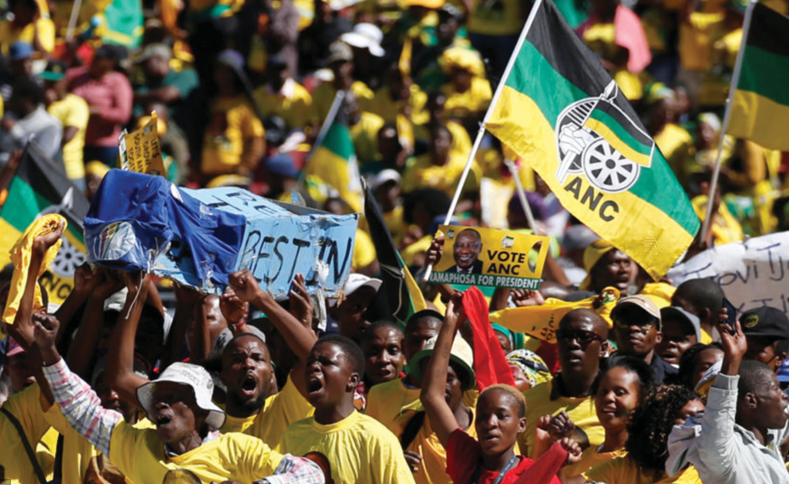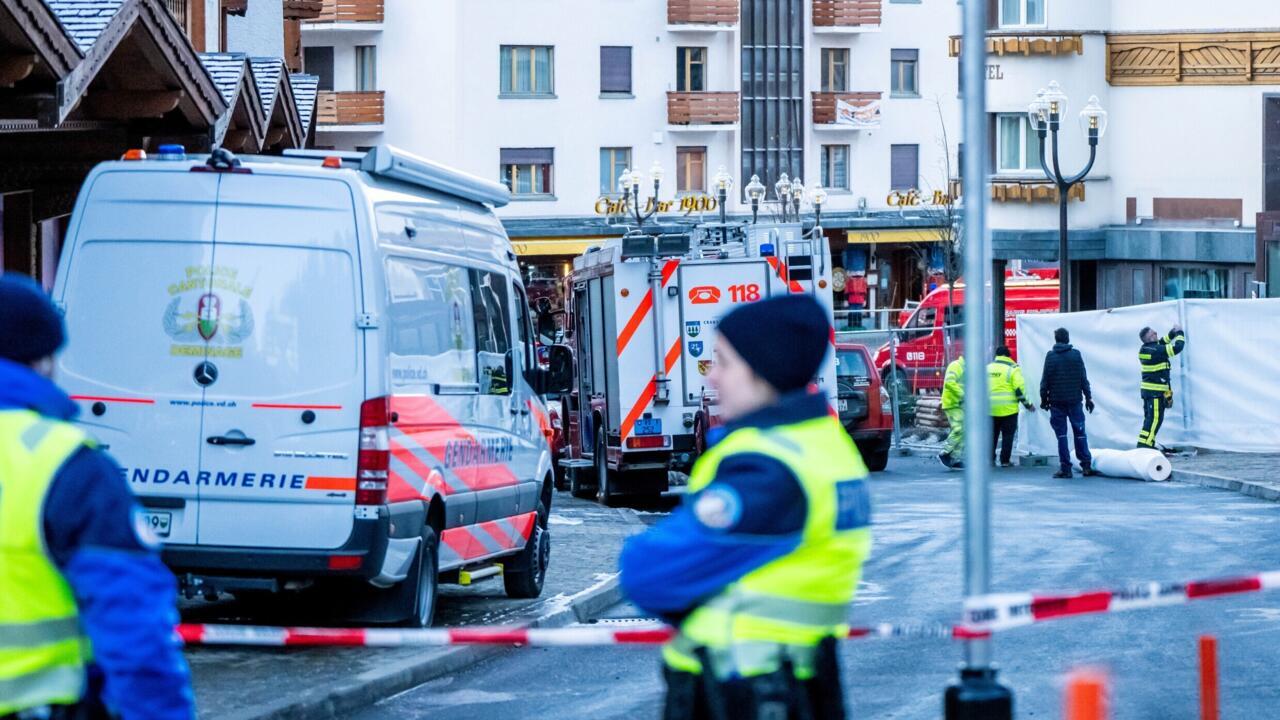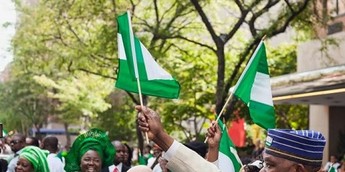News
ANC’s Iron Grip on South Africa Slips: A Political Earthquake Reshapes the Nation

In a nation grappling with one of the world’s highest unemployment rates, severe shortages of electricity and water, and rampant crime, South Africa’s governing par- ty, the African National Congress (ANC), has suffered a historic decline in voter support. Once a symbol of liberation and unity, the ANC now faces an uncertain future, having won significantly less than the nearly 58 percent of the vote it secured in the 2019 elections.
The decline of the ANC, Africa’s oldest liberation movement, marks a pivotal moment for one of the continent’s most stable nations and its largest economy. The party, which rose to international acclaim on the shoulders of Nelson Mandela, now has two weeks to form a government by partnering with rival parties that have previously denounced it as corrupt and vowed never to form an alliance with it. Maropene Ramokgopa, a top official in the ANC, expressed shock at the election results, signaling the party’s realization that they have missed something crucial. The loss has brought to light the internal and external challenges faced by the ANC, including ram- pant corruption and a deeply factionalized party structure.
President Cyril Ramaphosa, who leads the ANC, faces a grave threat to his ambition of serving a second term. Known for his negotiating skills that helped end apartheid, Ramaphosa must now unify his party and navigate a complex political landscape to form a coalition government. This task is further complicated by the internal divisions within the ANC and the external pressure from rival parties and the public.
Khulu Mbatha, an ANC veteran critical of the party’s handling of corruption, lamented the deterioration of conditions under Ramaphosa’s leadership. The ANC’s failure to address systemic corruption has been a significant factor in its decline, eroding public trust and support.
A major contributor to the ANC’s collapse is Jacob Zuma, Ramaphosa’s predecessor and archenemy. Zuma recently launched a new party, uMkhonto weSizwe (MK), which won nearly 15 percent of the vote, siphoning crucial support from the ANC. Despite the significant result for a new party, Zuma has discredited the election, claiming it was rigged and that his party actually won two-thirds of the vote.
Zuma’s actions foreshadow the political instability he could cause for the ANC. His refusal to accept the election results and threats to disrupt the certification process underscore the contentious political environment in South Africa. Without an absolute majority, the ANC can no longer unilaterally select the country’s president, who is elected by the 400-member National Assembly. With 52 parties in the national election, the ANC must now form alliances to secure a governing majority. This predicament upends South Africa’s political landscape and places the ANC at a critical juncture.
Potential coalition partners span the ideo- logical spectrum, posing significant challenges for the ANC. Aligning with certain parties could alienate parts of its base, complicating efforts to maintain a cohesive government. The ANC’s leaders must navigate these complex dynamics to form a stable coalition that can effectively govern.
Democratic Alliance (DA): The DA, which secured the second-largest share of the vote, is seen as a potential partner. However, the DA’s market-based economic policies and op- position to race-based affirmative action pose significant political risks for Ramaphosa. The DA’s stance on issues appealing to the right- wing white population further complicates the potential for a coalition.
Economic Freedom Fighters (EFF): Led by Julius Malema, the EFF presents another potential ally. The EFF’s platform of nationalizing mines and redistributing land to Black South Africans aligns with a segment of the ANC’s ideology but could deter international investors and big business. Malema’s conciliatory tone towards the ANC highlights a willingness to collaborate, but the ideological divide remains a hurdle.
The prospect of coalition governments raises concerns about political instability. Local coalition governments in South Africa have been marked by infighting and inefficiency, raising fears that a similar scenario could un- fold at the national level. This instability could distract from addressing the country’s pressing issues, such as unemployment, crime, and infrastructure deficiencies.
For many South Africans, the election rep- resents an opportunity for a significant reset akin to the transition to democracy in 1994. The slogan “2024 is our 1994” resonated with many voters, particularly the youth, signaling a desire for meaningful change and a break from the ANC’s past.
The ANC’s legacy as a liberation movement has lost its luster among younger South Africans who did not experience apartheid. Their disillusionment with the party’s failure to deliver tangible improvements in living conditions has driven the shift in electoral support.
The ANC’s decline could have broader implications for other former liberation movements in southern Africa, which have also seen declining electoral support. Analysts suggest that the outcome of South Africa’s election could foreshadow similar trends in neighboring countries, potentially reshaping the political landscape of the region.
Mavuso Msimang, a veteran ANC member, reflected on the party’s decline, attributing it to the failure to deliver basic services like electricity. The long lines at polling stations on Election Day signaled a shift in voter sentiment, as many South Africans expressed their dissatisfaction with the ANC’s governance.
South Africa stands at a crossroads, facing unprecedented political challenges and an uncertain future. The ANC’s historic decline in voter support underscores the urgent need for the party to address internal divisions, tackle corruption, and restore public trust. Forming a stable coalition government will be a crucial test for the ANC and its leadership, with significant implications for the country’s political stability and economic future.
As South Africans look to the future, the call for a reset offers a glimmer of hope for meaningful change and progress. The path forward will require strong leadership, unity, and a commitment to addressing the country’s most pressing issues, ensuring that the promise of liberation is fulfilled for all South Africans.
News
40 Dead, 119 Injured in Swiss Ski Resort Bar Fire

40 Dead, 119 Injured in Swiss Ski Resort Bar Fire
No fewer than 40 persons have been confirmed dead following a devastating fire outbreak at a bar in the Swiss ski resort town of Crans-Montana on New Year’s Eve, Swiss police have said.
Authorities on Sunday confirmed that the bodies of all 40 victims have now been identified.
The victims were aged between 14 and 39 years, with 15 of them under the age of 18.
The youngest victims were a 14-year-old Swiss girl and a 14-year-old French boy.
The deceased were drawn from several nationalities, including Swiss, Italian, Romanian, Turkish, Portuguese, French and Belgian citizens, as well as nationals of the United Kingdom, France and Israel, underscoring the international nature of the tragedy at the popular Alpine resort.
In addition to those killed, 119 people sustained varying degrees of injuries, most of them severe burns.
Police disclosed that six of the injured are in such critical condition that they have not yet been identified.
The fire broke out at Le Constellation bar, a venue known to be popular with young people in Crans-Montana, where the legal drinking age is 16.
A preliminary investigation indicated that sparklers attached to bottles and held too close to the ceiling may have ignited the blaze.
Swiss prosecutors have since opened a criminal investigation into the French couple who managed the bar.
The couple, identified by the media as Jacques and Jessica Moretti, are suspected of manslaughter by negligence, bodily harm by negligence and arson by negligence, according to the Valais regional prosecutor’s office.
The lead prosecutor in Valais canton, Ms Beatrice Pilloud, said investigators are examining whether the acoustic foam installed on the bar’s ceiling contributed to the rapid spread of the fire and whether it complied with existing safety regulations.
Police said no further personal details of the identified victims would be released out of respect for their families.
However, some relatives have begun to speak publicly as the scale of the tragedy sinks in.
On Saturday night, the mother of one of the victims, Ms Brodard-Sitre, announced via Facebook that her 16-year-old son, Arthur Brodard, was among those who died.
In an emotional video message, she said the family could now begin mourning, “knowing that he is in peace and in the light,” adding that her son had “left to party in paradise.”
Earlier, while Arthur was still listed as missing, his mother told local newspaper Le Temps that she had been “living a nightmare,” revealing that some of his friends had suffered burns to nearly half of their bodies.
“There are no words – they went through hell,” she said.
Italian media also identified 16-year-old junior golfer, Emanuele Galeppini, as one of the victims.
The Italian Golf Federation paid tribute to the teenager, describing him as a “young athlete who carried passion and authentic values.”
His father reportedly confirmed that the boy was at Le Constellation on the night of the incident, although Italian authorities had initially declined to confirm his death.
News
US Denies War With Venezuela as Tensions Rise After Maduro’s Capture

US Denies War With Venezuela as Tensions Rise After Maduro’s Capture
The United States has insisted it is not at war with Venezuela, a day after US forces carried out strikes that led to the capture of Venezuelan President Nicolás Maduro and his wife, Cilia Flores, in an operation that has sharply escalated tensions between the two countries.
US Secretary of State, Marco Rubio, said on Sunday that Washington’s actions should not be interpreted as a declaration of war, stressing that the operation was “limited and targeted.”
His comments came amid international concern over the implications of the US military action and growing uncertainty over Venezuela’s political future.
According to a spokesperson, Maduro and Flores are expected to appear in a US court on Monday, following their arrest.
The charges they will face were not immediately disclosed, but US officials have previously accused Maduro’s government of corruption, drug trafficking and human rights abuses.
Venezuela’s Defence Minister, Vladimir Padrino, confirmed that the US operation resulted in significant casualties, claiming that a large part of Maduro’s security team was killed, alongside what he described as “innocent civilians.”
Padrino condemned the strikes as a violation of Venezuela’s sovereignty and accused Washington of using excessive force.
In Caracas, the Venezuelan government formally denounced what it called “military aggression” by the United States.
In a statement, the Venezuelan armed forces said they remain loyal to interim President Delcy Rodríguez, signaling that Maduro’s allies still retain control of key state institutions despite his capture.
Trump, speaking in an interview with The Atlantic, warned that Rodríguez would “pay a big price” if she “does not do what is right,” a remark that has further inflamed tensions and raised fears of additional US pressure or sanctions.
News
How US Captured Venezuela’s President Maduro in Daring Overnight Raid

How US Captured Venezuela’s President Maduro in Daring Overnight Raid
United States forces have captured Venezuelan President Nicolas Maduro and his wife, Cilia Flores, following a highly coordinated overnight military operation in Caracas, marking one of the most dramatic US interventions in Latin America in decades.
The operation, code-named Operation Absolute Resolve, was launched late Friday after months of surveillance by US intelligence agencies, which closely monitored Maduro’s movements, residences and security arrangements.
According to US officials, the mission was finalised in early December after extensive rehearsals, including the construction of a full-scale replica of Maduro’s safe house for training.
President Donald Trump authorised the operation at 22:46 EST on Friday (03:46 GMT Saturday), shortly before midnight in Caracas, allowing US forces to operate under the cover of darkness.
The mission, lasting just over two hours, involved air, land and sea components and deployed more than 150 aircraft, including fighter jets, bombers and reconnaissance planes.
Explosions rocked Caracas around 02:00 local time as US strikes targeted key military installations, including air defence systems, La Carlota air base, Fuerte Tiuna military complex and Port La Guaira.
Large sections of the city were plunged into darkness, with Trump later claiming US forces disabled power supplies ahead of the raid.
As air strikes continued, elite US Delta Force troops moved into the city and stormed Maduro’s heavily fortified compound.
US officials said the troops encountered resistance, with one helicopter reportedly hit, though no US service member was killed.
Maduro was apprehended while attempting to reach a secure room inside the compound.
By about 04:20 local time, helicopters carrying Maduro and his wife had departed Venezuelan airspace. They are now in the custody of the US Department of Justice and are expected to be transferred to New York to face criminal charges related to drug trafficking and narco-terrorism.
The US had previously placed a $50 million reward on information leading to Maduro’s arrest.
President Trump announced the capture shortly after, hailing the operation as a major success. “Maduro and his wife will soon face the full might of American justice,” he said.
The action has drawn sharp international reactions. Brazil’s President Luiz Inácio Lula da Silva condemned the raid, warning it set a “dangerous precedent” for international relations.
In the US, some lawmakers criticised the administration for not seeking congressional authorisation before launching the operation.
Despite the controversy, US officials defended the secrecy and timing of the mission, insisting that prior disclosure could have compromised its success.
The arrest of Maduro, who has ruled Venezuela since 2013, is expected to have far-reaching political and security implications across the region.
-

 News6 days ago
News6 days agoHow US Captured Venezuela’s President Maduro in Daring Overnight Raid
-

 Analysis5 days ago
Analysis5 days agoAbroad and the Mirage of Greener Pastures, by Alabidun Shuaib AbdulRahman
-

 News6 days ago
News6 days agoUS Denies War With Venezuela as Tensions Rise After Maduro’s Capture
-

 News6 days ago
News6 days ago40 Dead, 119 Injured in Swiss Ski Resort Bar Fire
-

 Business5 days ago
Business5 days agoFG Targets One Exportable Product per LGA as Nigeria Deepens AfCFTA Push in 2026
-

 Analysis5 days ago
Analysis5 days agoUnderstanding Nigeria’s Tax Reforms from the Diaspora Lens, by Boniface Ihiasota










